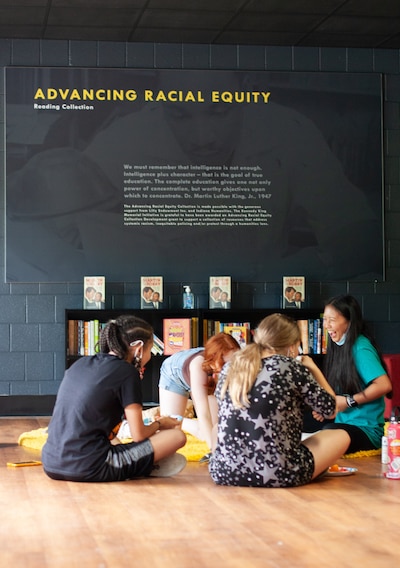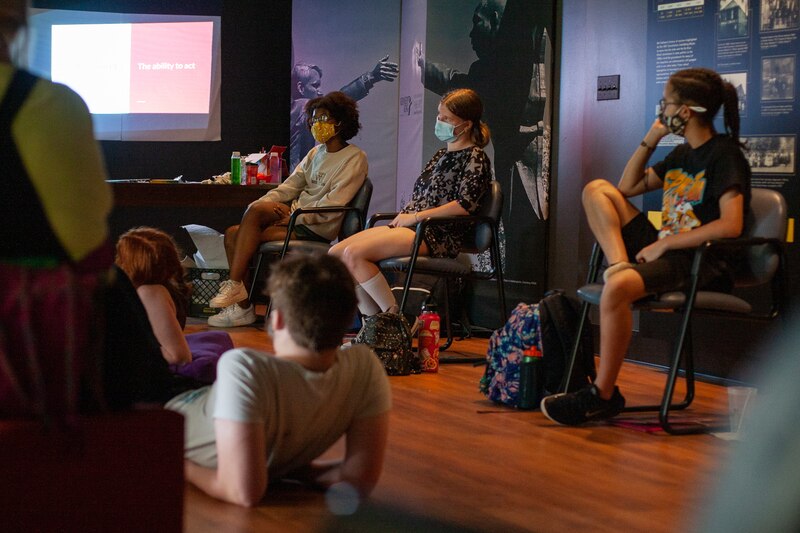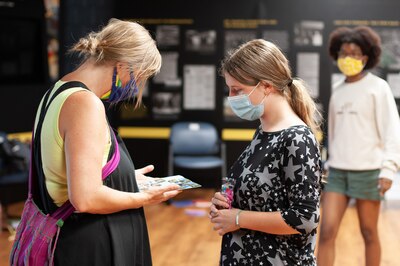Adler Preddie is concerned about issues like racism and sexism in society, especially after watching protests unfold on the news last summer. But when the 13-year-old tries to speak up about it, he says adults don’t listen.
“People don’t listen to kids, just because they’re young, even though some kids are smarter than some adults,” said Adler, who will start eighth grade at Westlane Middle School this year in northern Indianapolis.
So Adler’s mom signed him up for Social Justice Leadership Camp this summer, a two-week day camp in Indianapolis where he’s meeting teens with the same concerns — and adults who listen to them.
The camp provides 13- to 19-year-olds a place to talk about social justice, which caught the attention of many campers after the widespread social unrest of last summer. Camp leaders hope discussing how injustices happen will give students skills enabling them to advocate for social justice in the future.
Through discussion and creative activities, campers will explore topics like racial and economic justice, gender and sexuality justice, using your voice for power, and self care. Participants pay what they can on a sliding scale from $10 to $300 to attend daily from 9 a.m. to 4 p.m. with two sleepovers on Fridays.

Clare Wildhack-Nolan, director of equity learning at Peace Learning Center, founded the camp in 2012. Hailing from “white hippie culture,” Wildhack-Nolan said she was inspired by her grandfather, who was a lawyer for the NAACP during the civil rights movement.
Wildhack-Nolan taught social studies in Indianapolis and Chicago schools before moving to the Peace Learning Center to specialize in social justice education, a topic difficult to breach in public school classrooms.
“Generationally, our school systems purposely haven’t included antiracism,” she said. “We’re wanting to give [students] a space where they can have that critical analysis.”
Wildhack-Nolan is concerned about recent legislation in some states attempting to ban critical race theory, the academic framework that examines how policies and the law perpetuate systemic racism. Other states have sought to limit how students learn about race and racism. She worries the efforts in 27 states — including Indiana — could reduce learning about social justice-related topics even further, making camps like hers more important.
Wildhack-Nolan said she wants teens to leave the camp with a greater vocabulary of social justice-related words and concepts so they can identify and talk about injustice, an important first step in activism.

On the second day of the program this week, 10 campers sat in a circle of chairs, floor pillows, and yoga mats to discuss the meaning of power.
“I think they should lower the voting age,” said Jocelyn Whitley, 15. “It’s like the older generations are just choosing the president for us.”
“It’s not fair that I can’t vote when I may know more than a lot of adults,” another camper agreed.
The conversation touched on the Electoral College, the importance of local government, and how a camp counselor successfully petitioned her high school to amend an unpopular dress code. Campers cited the 2018 student protests against gun violence as an example of how teens can advocate for themselves.
Wildhack-Nolan wrapped up the discussion by encouraging the campers to take action in small ways, like calling school officials if they’re unhappy with a school policy.
“We all have the ability to take action,” Wildhack-Nolan told the group.

Wildhack-Nolan said the camp typically enrolls 10 to 15 teens, often from marginalized communities. While there wasn’t an increase in applications this summer, she said more white attendees cited an interest in race in their applications, possibly a result of last summer’s unrest.
Joey Pugh, who will be a sophomore at Westfield High School in Hamilton County, is one of those white teens. He wants to learn more about social issues so he’ll be able to speak up when he sees an injustice. He said the events of last summer increased his awareness of issues like systematic racism.
“I’ve heard all about this stuff, and I’m like, ‘Oh man, that sucks,’ but I’ve never actually done anything about it because I’ve never known where to start,” Joey said. “That really got me interested in learning more about it.”
Jocelyn Whitley, who will be a sophomore this year, said she has faced discrimination at her majority white school, Center Grove High School, for being adopted. These experiences piqued her interest in social justice.
“I want everybody to feel welcomed and equal, and I know that it’s not like that currently,” Jocelyn said. “I kind of just wanted to change that and do something for the greater good.”
Some campers have already participated in activism in their school communities.
Last year, then-junior Sumaiyah Ryan and a few of her friends started an Instagram to bring attention to discrimination at her majority white Hamilton County school, Westfield High School. Students could submit anonymous descriptions of discriminatory incidents to be posted on the account.
“People were really learning from it,” Sumaiyah said. “People were thinking, like, ‘Oh, our school’s a good place for minorities,’ but then they were finding out that it actually wasn’t.”
The account gained traction, and soon Westfield administrators asked Sumaiyah and her friends to meet and discuss their concerns. Now, Sumaiyah works with administrators on equity teams for Westfield-Washington Schools. She said she plans to repurpose some activities from camp as the new president of her school’s Equality Club.
Aside from social justice lessons, Wildhack-Nolan said she hopes the camp will provide a safe space where teens can connect with each other.
“A lot of what youth say they take away from this experience is getting to connect to other youth who care, and having really good conversations where they feel heard,” she said.







